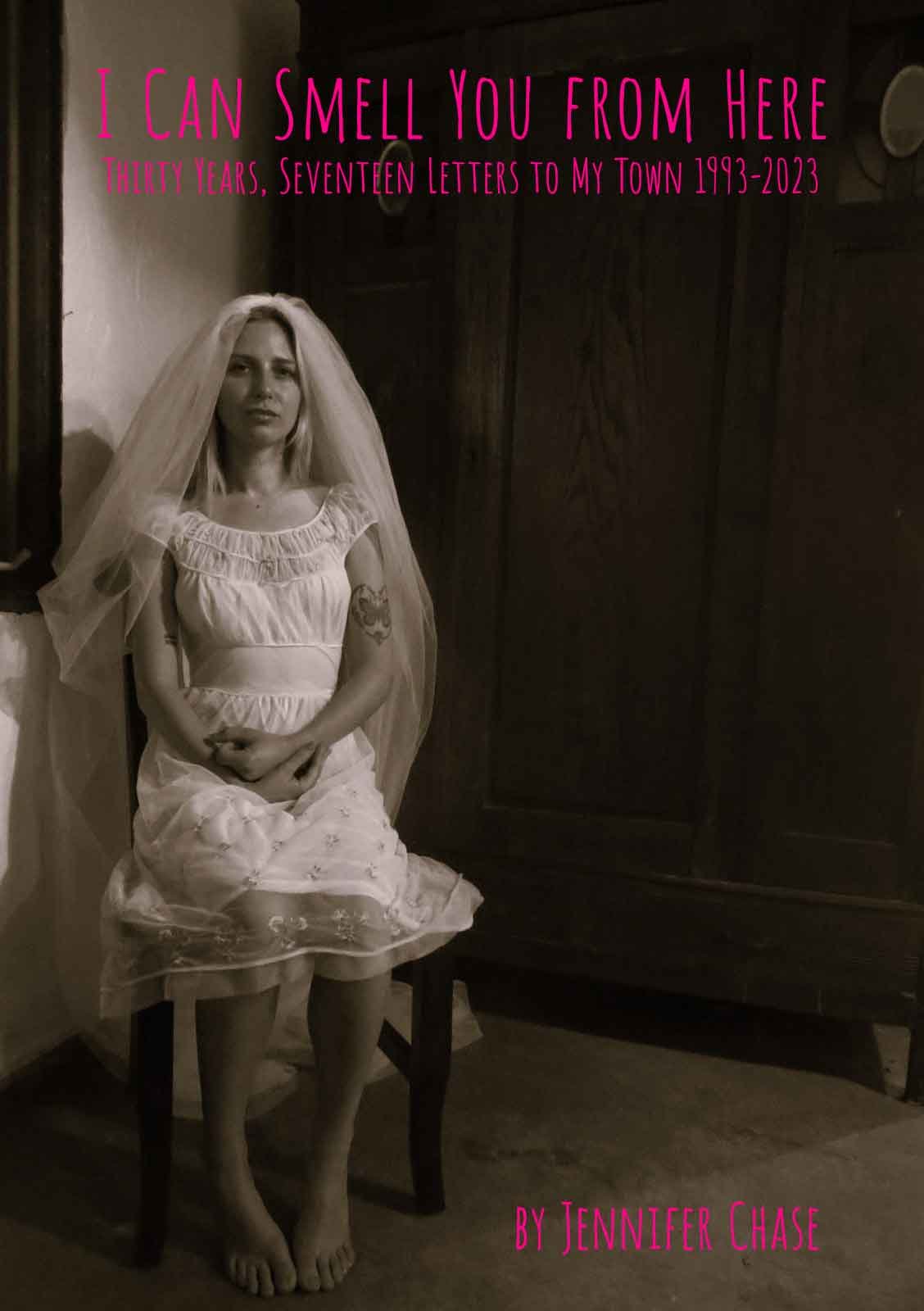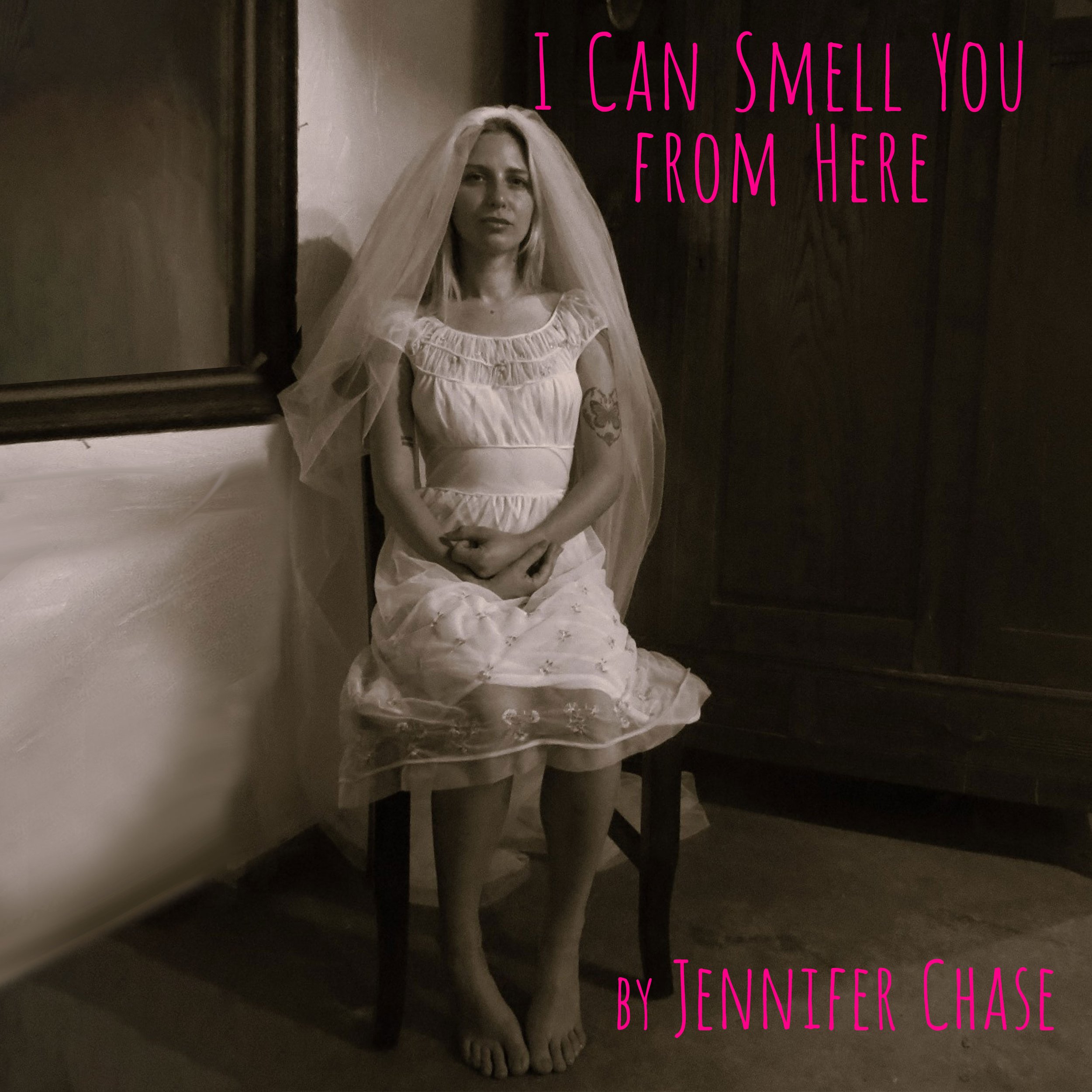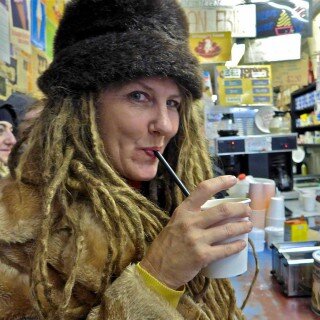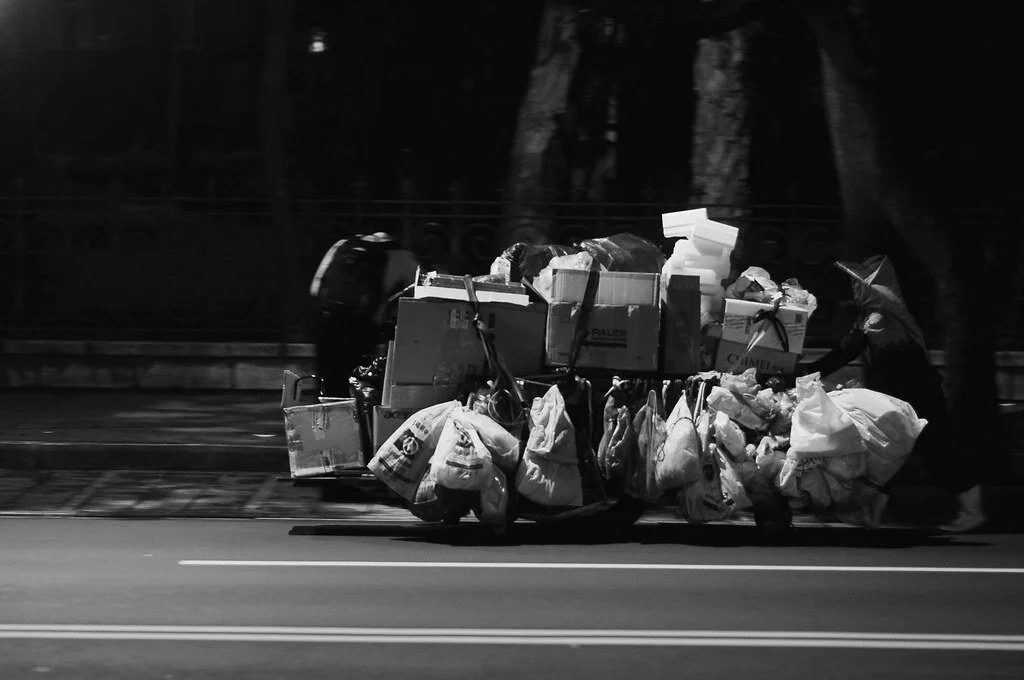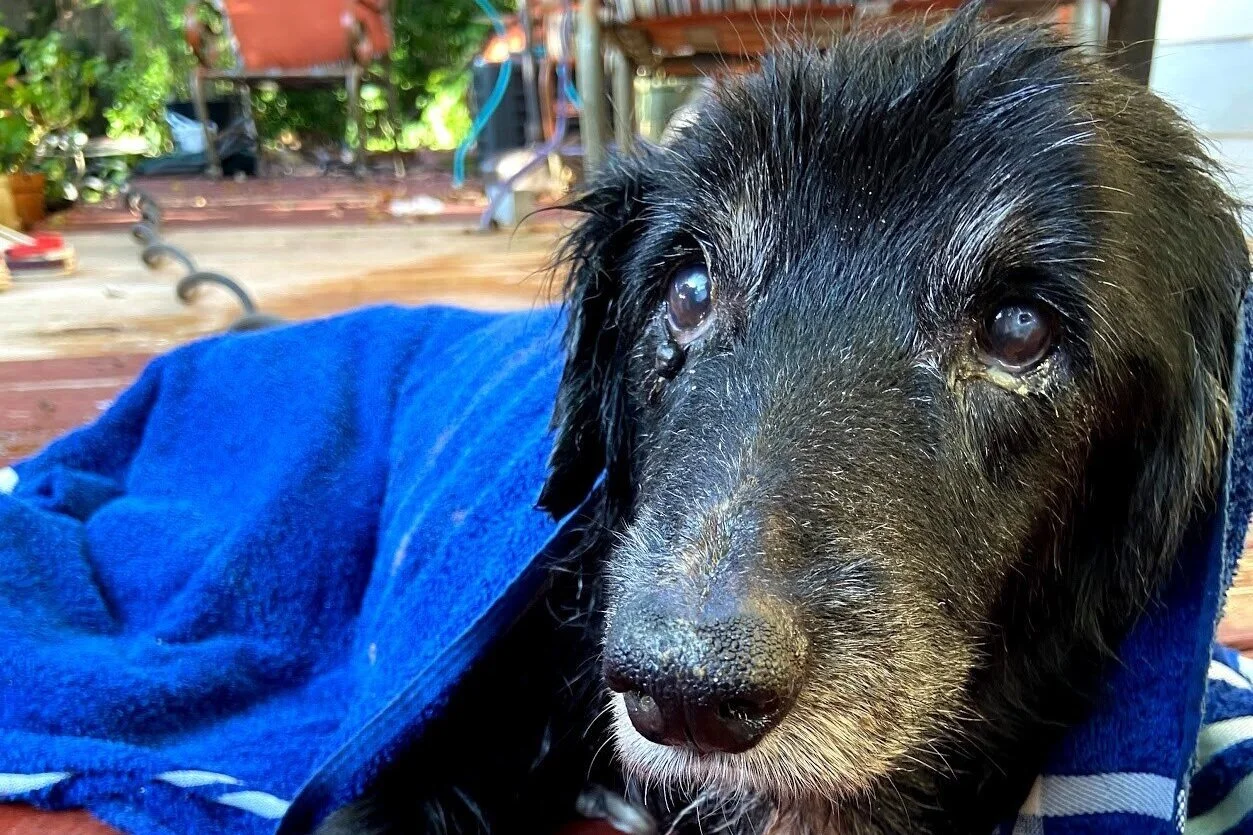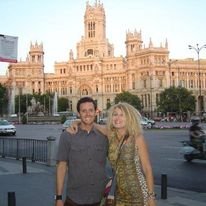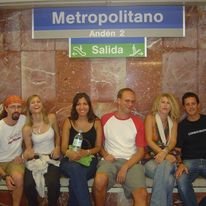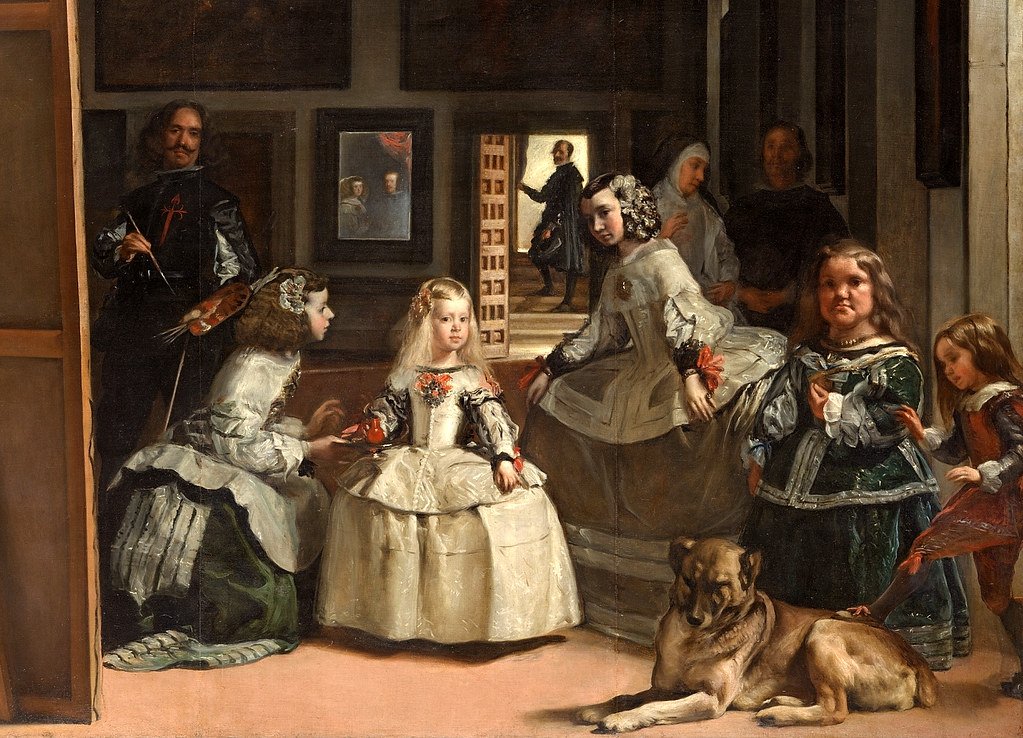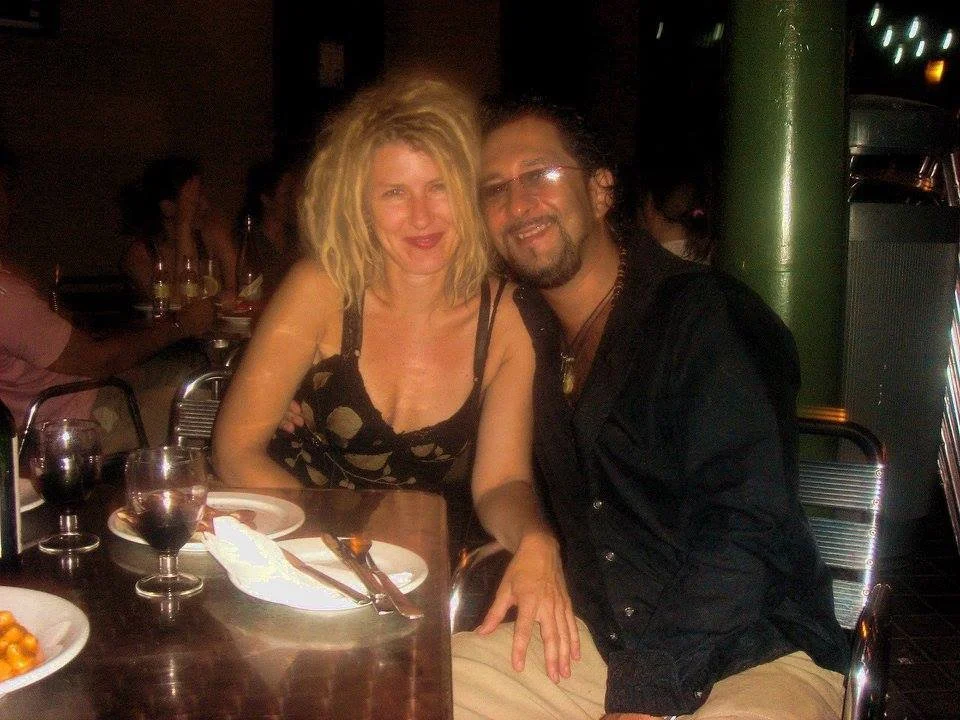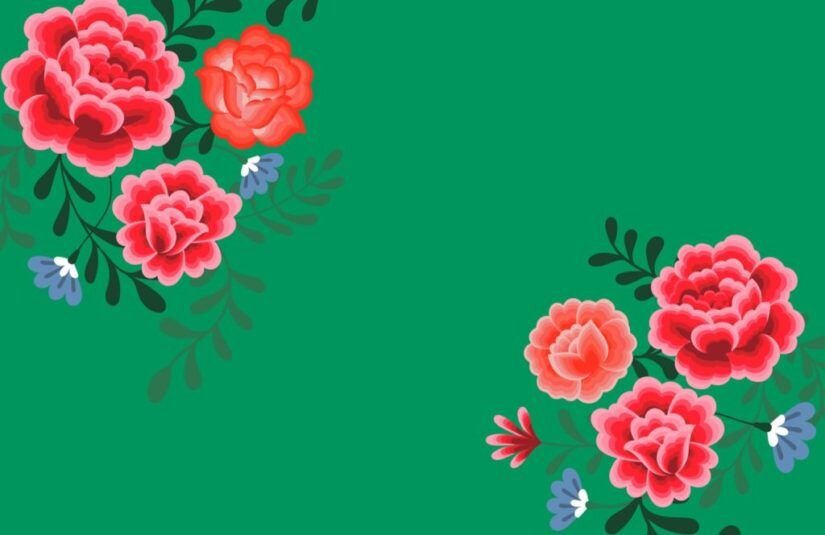
New Memoir now available in paper back from Amazon! Locals in Jax, Fl. can find it at Happy Medium Books and Cafe, Chamblin’s Uptown, and Chamblin Bookmine.
I Can Smell You from Here: Thirty Years, Seventeen Letters to My Town 1993-2023
Jennifer Chase is a “smell person,” confident that, if her three children were kidnapped and she were blindfolded, with her ears plugged, and allowed to use only her nose among dozens of kidnapped children, she’d definitely find them. Yet somehow, she finds herself living, working, and creating for over thirty years in a town once famously known as Jacksonville-the “City that Smells.”
Turning 59, and in a post-menopausal, post-COVID, empty-nested existential crisis, Jennifer experiences writer’s block and imposter syndrome at the same time. She’s a professor but doesn’t consider herself a “real academic.” She writes plays that are produced and songs that she performs professionally but doesn’t consider herself a “real artist.” She mulls over her condition while renovating her 82-year-old kitchen in the house where she’s lived for decades while raising her kids among the gris gris from her past-cherished mementoes and sacred objects.
She writes letters to Jax, the town with which she has a love/hate relationship, as we vicariously travel the world with Jennifer, meeting other characters, like the partner whose careless mistake results in a terrible accident involving their daughter; the violent West African she marries, then flees; the married European couple that ignites a romantic/creative spark she can’t forget; and her Spanish boyfriend-turned-husband of fifteen years.
Over the course of seventeen letters spanning thirty years, Jennifer writes, performs, and produces songs, plays, and musicals, while also co-starring in a documentary film recreating the historic trip up the St. Johns River by Marjorie Kinnan Rawlings.
It’s hard to imagine an artist of such prolific output experiencing self-doubt, but we learn through her letters to Jax that it is the city’s lukewarm reception to her attempts to tell its stories that instills this fear within her. Over the course of this unique memoir, however, we discover along with the writer that the work itself is the gift that she and the city have given one another. “It’s the smell of the process,” she writes. “It’s home.”
But art, passion, and being “home” seemed easier when it was harder.
“The ache for home lives in all of us, the safe place where we can go as we are and not be questioned.
”
Artist Statement
“My work is character-driven. Whether my characters are historical or contemporary, African or American, autobiographical or fictional, refugees or rebels; They tell the truth. Whether my characters find themselves in my musicals or monologues, dramas or dreams, solo-pieces or songs, they tell the truth. My characters tell the truth. Through them, I aim to uncover your curiosity about their seemingly exotic differences and stories. Like us, my characters are guided by a fundamental ache for home. You follow them and embark on their emotional journeys until you find yourself experiencing something familiar. Our shared truth. My work leverages that “something familiar” to self-discovery. It’s what gives us hope, love, identity, and perseverance.”

Jenn in “The Doorway of No Return” - Dakar, Senegal 1998, the inspiration for the song and musical drama, “Majigeen” the story of Anta Majigeen Njaay-book, lyrics, and music written by Jennifer Chase. (All rights reserved.)
Chaseography
Jenn's plays and music take her performances and recording projects to France, Spain and Senegal, Africa. As an opening act for Grammy winners the Doobie Brothers, The Rippingtons, and Lisa Lobe, she has written and released six albums of original music.
4:35 a.m @ Ray’s Candy Store, NYC
photo credit Peter Brownscombe
Recently Jenn was honored as a 2022-23 Art Ventures grantee by The Community Foundation for Northeast Florida that funded her newly released groundbreaking memoir, I Can Smell You from Here: Thirty Years, Seventeen Letters to My Town and an companion 7-song EP of new music by the same title. In May of 2021 she was one of six international artists in residence in Oaxaca, Mexico at the Arquetopia Foundation. In 2020, Jenn was awarded a travel grant through APAP Cultural Exchange Fund, funded by Andrew Mellon Foundation to travel to Dakar, Senegal.
Her plays, musical performances, and writing workshops have been featured at fine venues and festivals such as: “Park for Your Problems,” at the Davenport Theatre in NYC, National Parks Services, DASOTA Writer's Festival, Alliance Française, Body & Soul, the Cummer Museum, Mayo Clinic Humanities in Medicine Program, Florida State College at Jacksonville, University of North Florida, cultural centers and theatres regionally and internationally. In film/television she performed in and written original music for, the P.B.S. documentary, "In Marjorie's Wake."
She has 6 original albums including “Kid Jail,” “Famadihana,” “Marjorie’s Wake,” “Artichoke Soup” (from the original drama of the same name), and her original single “Majigeen," recorded in Dakar, Senegal with pop group Les Freres Guissé. Her newest 7-song EP, I Can Smell You from Here, is a companion to her memoir of the same title.
Her plays include dramas "Handmaid" and "Artichoke Soup," a series of monologues: "Eva Chase Wood?" and musicals "Majigeen" and "La Caroline," which traveled to Nantes, France. Jenn and collaborative partner John E. Citrone, were awarded residencies at the prestigious CAP 21 Musical Theater Conservatory in NYC. Jenn has been awarded grants including an Art Ventures grant from the Jacksonville Community Foundation, a Division of Cultural Affairs grant through the Jacksonville Historical Society, and a generous grant from The Maison des Etats Unis, in Nantes,France. In 2014 Jenn was the inaugural Artist-in-Residence at MOSH.
She has studied, written, performed, and taught abroad in Dakar, Senegal at the ACI Baobab Center through a Rotary Ambassadorial grant: at the University of New Orleans summer seminars in Madrid, Spain, and throughout France.
She has a B.A. in International Studies and French from the University of North Florida and an M.F.A. in Creative Writing from the University of New Orleans.
Jennifer is an award-winning professor of Humanities, English, and Creative Writing at Florida State College since 2003 and produces page-to-stage works in progress through her production company aJENNda productions. When not writing, performing, or teaching, Jenn enjoys family, travel, beekeeping, cooking, and hosting visitors at her treehouse Airbnb. Jenn is currently on sabbatical and is writing and studying, as an alumnus at Arquetopia’s Cusco Peru location, and at home.

Blog
Las Meninas- painted by Diego Velazquez 1656
What’s Love Got To Do With It? - a Reflection on Love and Creativity in Madrid 2006
Part I: Should I Go? – Spring -2006
“Bill, there’s no way that I’m going to Montpellier this summer! I’m sick of speaking French, the baggage, existentialism, complaints, disappointments. I don’t want to go anymore.”
It was April 2006- I had just dramatically ended two and a half months of hosting French friends and their nine-year-old son. My decision to end the hosting was the lesser of two painful options. The result was the end of our musical collaboration- an album we had been writing and recording, a love affair, and the friendship-- all in one fell swoop. I had unwittingly spun a complicated web for myself. That’s another story. For more on this (Plug to follow) see my published play Artichoke Soup and listen to the album of the same title both available on my website https://jennchase.com/purchases
I called my grad school advisor, Bill Lavender at the University of New Orleans. I had planned on studying with non-fiction writers for a graduate seminar in Montpellier, France. Montpellier coincidentally was the home base of French friends with whom I had just broken up.
JC: “Bill, there’s no way that I’m going to Montpellier this summer! I’m sick of speaking French, the baggage, existentialism, complaints, disappointments, and I don’t want to go anymore.”
BL: “So, come to Madrid! All the playwrights will be there. And I’ll be there teaching a course too,” he said.
JC: “Sounds great. I have no interest in Spain. I don’t speak Spanish. I don’t know anyone there. I can concentrate on my writing and not create any drama for myself except those I’m supposed to write...”
This was a very uncharacteristically mature choice for me to make. It had been only three years before that I had helped my then-husband get on a plane to return to his native Senegal to be with his ailing father. After enduring sometimes daily violent scenes that crossed over two continents, four years, and three pregnancies, in retrospect, I was also helping myself. I had hidden it from my friends and family. I felt like a failure as a mother, artist, and person. When we met in 1998, I had been certain that he was my destiny.
Now in 2006-forty-one years of age, two and a half marriages behind me (the marriages, especially the ½ marriage, are other stories for which I have no play or album to link you to for now :) and three children later, I finally accepted that perhaps perception of romantic love and identifying my romantic “destiny” wasn’t my gift. The colossal demise of the creative ménage á trois -and subsequent emotionally charged departure of my French friends, earlier that spring had galvanized that realization. I knew that I made my own bed though at least-no pun intended.
I began making plans to leave my three children for the month of July. The four and five-year-old with my sister and my 16-year-old with her dad aka-basically no supervision-- which made her a little happy to see me go. I gave little thought or research to this place I was going to study. I had to do some very serious creative financing to ensure that my children had summer camp to go to while staying with my sister, a single mother of two herself. I was teaching English to refugees and performing solo gigs while in grad school. Both things were meaningful work that I loved, but not financially conducive to a family of four. I figured it out. And I went to see a doctor.
“I don’t know what’s wrong with me. I sometimes look out the kitchen window and cry,” I told her.
She asked me to tell her what had been going on in my life. I recounted the abusive marriage and subsequent living as a single mother of three, my part-time self-employment gigs to try to hold on to our home and keep afloat, and everything in between, culminating in the recent demise of the recording collaboration and with my friends from France.
I told my doctor that wasn’t sure I was doing the right thing by leaving. I prided myself on the fact that –although we had no money—my children traveled abroad with me. I didn’t know if leaving them behind would be good. Flying away to a new, old place had its charm though, especially to study and write in a grad scholarly setting abroad.
my daughter, Mariama; my son, Amadou; me -2007
Most of my artistic life had been as a singer/songwriter. I had only written one play, a musical, and even that was prior to grad school. I needed to see if I even had any talent to study and write plays. In my state it could easily result in a creative implosion. Would I even be inspired at all to create? Was I a real artist? A real student?
“You’re depressed,” my doctor said.
“No, I’m not. I’ve never been depressed in my life. I don’t have time to be depressed.”
“Well, you are now. The good news is, that you have reason to be. I can help with that.”
“Okay? Great?”
“Yes, actually. There are patients who come to me and say, that they look out the kitchen window every day and cry but they don’t know why. That they have no problems, great marriage, and money. But they are miserable. You have many obstacles that could make anyone depressed. Madrid may be the perfect thing. You can focus on you.”
So, Madrid it was. I told my friends and family my plan. I would stay in a dorm with other grad students. Meals were included, and my financial aid and scholarships covered most of it. Grocery shopping one day. I told “Dairy Mary” the beloved, braided, cameo-wearing Publix Dairy worker who quipped,
DM: “Are you going to bring home a husband again this time?”
JC: “Nooooooo! I’ll be studying and writing. I’m in a graduate program there.”
DM:“Okay!”
I was indignant. It’s true that I DID bring home a person -after six months in west Africa,-who later turned out to be a husband. It’s also true that six years later, I brought home an entire family after returning from France, still though, her remark was so uncalled for.
She was silenced. For now. I knew that it was time to make a commitment to my chosen life as an artist. A graduate degree would give me the time and space to hone my craft and later teach in a college setting. I knew I wanted to write, perform, research, and teach, but that all of those things had to have the same me, the creative me. Not different clothes or schedules. Mother, musician, playwright, educator, performer, activist. Those roles had to seamlessly intersect.
I dreaded my hair and bought a ticket to Madrid.
Part II: So I Went- Madrid-Summer 2006_____________________
The best thing so far about my imminent departure was that I’d miss the Fourth of July.
It was a holiday that I tried to avoid since I became a mom in my mid-twenties. The Fourth of July held for me a subconscious connection with loneliness. It seemed that every fourth of July since my first as a mother had involved me watching fireworks alone in a crowd with one baby or more. It always felt contrived to engage in the festivities, flags, pledges of allegiance, National Anthem, parades, barbecues, fireworks. Also, the public proclamations of exclusivity and the inability to include an honest conversation about how to improve the country for everyone. Kind of like having to abruptly stand during a Catholic mass for the Profession of Faith, the pageantry has its allure, even comfort, but its inherent omissions were a missed opportunity. Ignoring serious human rights needs and marching forward without a real honest look at those left out of the “American Dream” was something I couldn’t get behind.
My plane for Madrid would leave the evening of July 3rd and arrive in Madrid early morning of the 4th releasing me from this awkward cultural expectation. Before leaving for the airport, Dad took me for a breakfast. Throughout any tough moment in my life, Dad could always be counted on for breakfast and encouragement at any hour of the day. (Most notably during a torrential rainstorm in 1985 -at four in the morning outside of a Brown Derby restaurant- in Newport Richie, Fl. after being fired from a band I quit college to join. That’s another story:)
My Dad & me
“You know what?”, he said over his fried eggs and corned beef hash.
“The kids are going to be fine. And you, my friend, you’re going to create something new. You’ll see. You’re going to be fantastic.”
I knew he was right at least about the first part.
My young children would have a blast with their cousins and my oldest daughter could be with her friends, which is kind of a dream come true for a sixteen-year-old. I could avoid the whole day of the 4th altogether guilt-free...
I arrived at my dorm in Madrid on the morning of the fourth. Independence Day. I was jet- lagged and a little hung over. I had my own room with a single bed and a “baño-mate” who had an adjacent room. A knock on my door. A paralyzingly- innocent smiling girl, says,
“Hey, are you going to the welcome dinner?.”
Half charmed and half irritated at her abruptness I said.
“Hi? I’m Jen.”
“Oh sorry. We share a bathroom. I’m next door. I’m Summer. Summer Dorr.”
Who is named that in all the world? Over the course of our program we would become inseparable. I, a big sister and confidante. She, a blossoming woman-child.
My baño-mate, Summer Dorr and me- Madrid 2006
At the welcome dinner and party for the UNO grad students I met others who would become my summer pals. Among them was Tara, an astounding beauty who was melding Quantum Physics and photography for a project called “Doors of Perception,” a that was so creatively cerebral it and intimidating that her side hobby- astute and spontaneous clothed pole dancing- put her over the top in an almost gluttonous abundance of talents. There was G.M Palmer, poet, dad, and wandering songsmith, the storied Bill Lavender, poet/professor, and my advisor, and Eric, California writer, would-be vegetarian, and skateboarder, who would become a longtime friend and little brother. After the festivities, many of us went to a bar called, Campus (kam-POOhsss). By that time, I was jet-lagged, hungover, and re-buzzed with new friends and faculty in my summer country. The bartender spoke English. There was something enchanting but familiar about him. We exchanged emails. The next day, I vaguely remembered a guy with Tom Petty , ‘Don’t Come Around Here No More-esque’ tinted glasses, named Aurelio. I found an email. My new pen pal in Spain arrived home from work each day apparently about the same time that took my morning metro to class. Besides a late-night stop at the bar each night with my fellow grad students, this was the way we began a friendship…Emails detailing music, art, interests, pictures of family that I would receive in the morning when I woke up and reply to for him to see in the afternoon when he woke up.
As for my studies, a whole new world was opening up to me. We had small classes with a morning session and an afternoon session. Playwriting with Steven Bogart, a brilliant and understated creative force, whose philosophy about Character changed the trajectory of my writing, and Form and Idea in Media taught by Bill Lavender that I found so intellectually challenging and rewarding, that drinks afterwards were not an indulgence but a well-deserved necessity. Sometimes I attended an optional Spanish class in between. We continued subsequent discussions over drinks in various tapas bars-often with our professors. We would continue on to Campus and discuss our projects. Aure was busy but interested in the discussions and we had an easy familiarity in our conversations. No one knew that our correspondence was getting more detailed and important. I went back to my dorm room, often staying up even later to continue talking with Summer Dorr.
There was only one problem. I had arrived in Madrid without a project, all of my fellow grad students brought projects and experience to the class. I was unaware that it bothered me so much. At night my dreams included many of my friends and family and especially new friends in Madrid --all pregnant. I took the dreams very literally. The pregnant-themed dreams were surprising. Did I have some sort of subconscious jealousy or desire to have more children or to be younger or something? If I did, I wasn’t aware of it. I felt freer in this moment than I had in a long time. Yet the dreams continued. Summer Dorr was pregnant, other new friends in Madrid and back at home too. Until Bill Lavender assigned a Michel Foucault article (The Order of Things) about the Velazquez painting, Las Meninas. On a subsequent class excursion to the Prado Museum, Bill mused about its philosophy and his.
I was fascinated by the time-traveling artist, Velazquez and the well-planned head game he decided to play with us centuries ago. That night I went home to my dorm and had a dream that I heard a baby crying. I was somewhere in eastern Europe climbing some sort of fire escape stairs outside of this kind of tenement apartment. I was walking toward the sound of the crying baby, methodically. Apparently, this was routine for me. I knew exactly where I was going.
I arrived at the outside of an apartment where the baby could be heard crying inside. I knocked. Several generations of people answered the door. They were happy to see me and handed me the crying baby. I took the baby and walked the halls of the building. The baby stopped crying and fell sound asleep. Then I returned to the apartment and knocked on the door. The multi-generational inhabitants seemed grateful as I returned a tranquil sleeping child. And I left.
The next morning, I woke up in my dorm room and had the idea for what became my thesis play, Handmaid, in which the painting Las Meninas, its creator and its inhabitants parallel a fictional set of characters in Miami’s, Little Havana. For the next twenty-four months, I was on fire writing this play. I never had a dream in which everyone around me was pregnant again. It was creative pregnancies I envied, not literal ones. My fellow grad students all had brought projects with them to Spain. They were pregnant with ideas-on fire. And now so was I.
Another fire too was starting. The email friendship and nightly drink at the bar Aurelio managed was becoming more familiar to me. I interviewed him for my play, which like the Foucault article’s philosophy on art as artifact, could itself become an artifact, a statement about our society today, the role of an artist in it, and the expectations and conflicting “obligations” that can preclude creative truth. Aure was unwittingly becoming a source for my main character, Rodriguez, who begrudgingly takes on a commission to create a replica of the painting and receives visits from Velazquez himself.
I still looked forward to Aure’s emails with pictures, book recommendations, music, questions, poetry, but I had a hunch that there was more there. Unlike other times in my life, it didn’t feel tragic, desperate. It seemed comfortable and warm.
It wasn’t until I invited him to my birthday party at a Senegalese restaurant in Madrid weeks later that I ever saw him outside of a nightcap while he worked and subsequent emails the next morning. And I learned my hunch was mutual…
Aure and me- Madrid 2006


